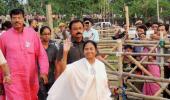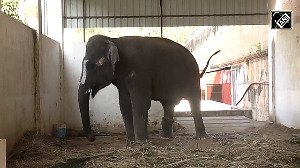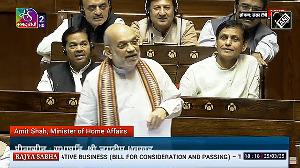The idle talk at street corners, cafes and public places since May 23 is that the winds of change are blowing across Bengal.
If the Lok Sabha figures are extrapolated, then the BJP is ahead in 130 assembly segments in a 294-member House. Ishita Ayan Dutt reports.

The Trinamool Congress's performance in the general election has put Mamata Banerjee's government on shaky ground ahead of the assembly election in 2021.
Since Writers' Building (the then state secretariat) ushered in paribartan (change) in 2011, there has been no looking back for Banerjee -- her popularity and support grew with each election.
Be it the assembly, the civic or the panchayat polls, the TMC supremo had become nigh-invincible, what the Left used to be in Bengal, only in a much shorter period.
But the performance of the party in the Lok Sabha polls is now threatening the continuity of a rule that was otherwise presupposed.
From a landslide victory in 2014 with 34 seats, Banerjee's party is now reduced to 22.
What is more worrying being that the Bharatiya Janata Party is close on its heels with 18 seats and the gap in the vote share of the two parties is just 3 per cent.
The idle talk at street corners, cafes and public places since the poll results surfaced on May 23 is that the winds of change are blowing across Bengal.
'Paribartan ashche abar (Change will arrive again)' is capturing the imagination of Bengal and Banerjee must know that it can wreak havoc, having pioneered it.
A bureaucrat remembered how the election results of 2009 (Lok Sabha elections) had sowed the seeds of paribartan, which reverberated through Bengal.
When a wide section of the Bengal intelligentsia united against the Left and raised the 'Paribartan Chai' slogan, like inception, the idea took hold of Bengal's mind.
In many ways, the results of 2019 are a deja vu moment with shades of 2009.
Political analyst Sabyasachi Basu Ray Chaudhury said there was a resemblance between the results of 2019 and 2009.
"The TMC was the main challenger to the Left in 2009 and had bagged 19 seats. This time, the BJP is near about there with 18 seats," he said.
Vote share-wise, however, the BJP has done better than the TMC in 2009. The TMC then had got a 31.18 per cent vote share, while the BJP this time has got 40.3 per cent, a stunning increase from 17 per cent in 2014.
The 2009 election marked the beginning of the end of the Left rule in Bengal and if observers are to be believed, it could well end the same way for the TMC.
"The TMC could see a rerun of the same if it is not able to prevent a mass exodus from the party as is anticipated," said Basu Ray Chaudhury.
"A lot will depend on if the party can protect its dominance. If it doesn't lose leaders and workers, it might be possible to fight back," he said.
But there could be challenges on other fronts. What might make things difficult is that a section of the civil administration has moved away much like that it had done during the last leg of the Left rule.
The administration is a disgruntled lot on quite a few counts.
The gap between the dearness allowance (DA) of the central government and the state government employees is about 23 per cent. That’s after the state government decided to pay DA at 125 per cent from January.
Also, the tenure of the state's Sixth Pay Commission has been extended by six months in November.
The administration is also caught in the tussle between leaders and workers of the TMC and the BJP. It had reached unprecedented proportions and heightened before the general election.
And now, law and order problems are likely to compound.
Speak to the bureaucrats and they caution that law and order problems may lead to early polls in Bengal.
After all, this was the first election in Bengal where communalism played a role.
Over the past couple of years since the BJP started spreading its wings in the state, there have been a few communal clashes.
"At this moment it would be difficult to say what might happen in the assembly election but clearly it's advantage BJP," said Basu Ray Chaudhury.
Local BJP leaders are giving the TMC government life of 90 to 180 days.
If Lok Sabha figures are extrapolated, then the BJP is ahead in 130 assembly segments in a 294-member House.
Polarising the electorate has got the BJP so far and there is no doubt that it will stay the course.
Soon after Lok Sabha polls results, Banerjee wrote a poem 'I Do Not Agree' and tweeted it.
The poem talks about how she doesn't believe in selling religious aggression or the colour of communalism.
But Banerjee must be aware of Karl Marx's oft quoted saying -- 'Religion is the opium of the people'.












 © 2025
© 2025